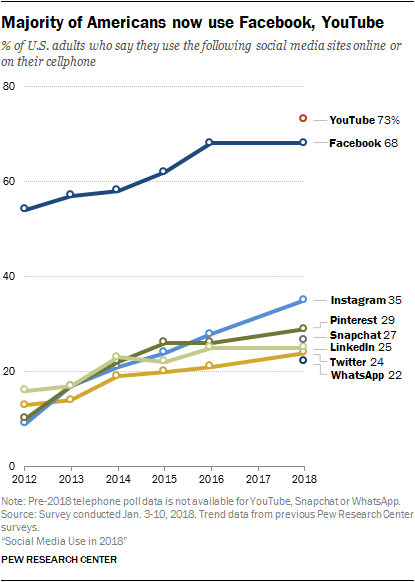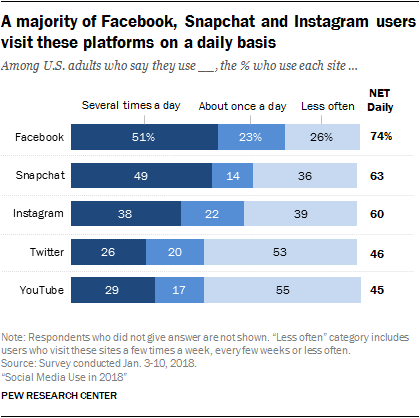Facebook and YouTube dominate, but consider varying social media outreach
In recent columns, Susan Stitt and I have been pushing social media strategies, because that community-building effort is absolutely essential in publishing, these days. Now, a brand new Pew Research report on social media trends confirms a few assumptions we’ve been making over the past year.

Here’s a big one, in my view: Don’t depend on Twitter! Susan and I both use Twitter on a regular basis. That’s mainly because we began working extensively in online media around , the milestone year when the iPhone and the Kindle both were released. I remember first signing up for Twitter in early at a publishing conference in New York City when one media guru after another told the crowd that everyone needed to master that platform.
To this day, when I publish a column related to new books on this website or at ReadTheSpirit magazine, the first supportive messages I receive from friendly publishing-industry professionals is: I Tweeted the link!
In other words, industry-wide, we love our Twitter and hope it will do more than Twitter is likely to actually do for us.
Looking at the Pew data, many of my doubts about Twitter as an effective medium for authors and publishers seem to be confirmed. Already, research shows that Tweets flow past people so quickly that very few Twitter followers ever click on a book-related link. A Washington Post article more than a year ago was one among many reports on how few people effectively interact with Twitter. In fact, the Post found, the vast majority of people who take the time to share Twitter links in various ways—never actually click the link they are sharing! According to another report last year, the average percentage of Twitter followers who will click on a link recommended in a Twitter feed is less than 1%. The sad new is: Virtually no one seems to be clicking those links we so eagerly share with each other.
Now, in this new report, the Pew social media usage chart puts Twitter down in the forest of other social media options—far below Facebook and YouTube. Thinking back to those gurus who urged all of us in the publishing industry to rely on Twitter a decade ago—that advice seems to have been eclipsed. I’m not saying we all should abandon our Twitter feeds. However, I am saying: We can’t rely on them as the foundation of our social media outreach.
Where’s the good news in this Pew report? As Susan and I have been writing in these columns: America lives on Facebook. According to Pew:
As has been the case since the Pew Center began surveying about the use of different social media in , Facebook remains the primary platform for most Americans. Roughly two-thirds of U.S. adults (68%) now report that they are Facebook users, and roughly three-quarters of those users access Facebook on a daily basis. With the exception of those 65 and older, a majority of Americans across a wide range of demographic groups now use Facebook.
Yes, many industry observers have been advising authors, publishers and marketing professionals that Facebook is making it more difficult to broadcast free promotions. We all follow those headlines. But the underlying truth here is that Facebook works best when our focus is on honest, authentic connections between friends and colleagues—sharing real news that matters to us as individuals. In other words, telling your friends how much you’re enjoying a new book is still a powerful way to share news. (And if you like to talk about what you’re reading, check out Susan’s earlier column on Goodreads.)
The two other take aways from this new Pew report for those of us who love books are:
 First, remember to regularly check your social media accounts. (See Susan’s earlier column on how often to check.) Consider the Pew chart on frequency of social media use and, again, you’ll come away impressed with Facebook’s role in daily life.
First, remember to regularly check your social media accounts. (See Susan’s earlier column on how often to check.) Consider the Pew chart on frequency of social media use and, again, you’ll come away impressed with Facebook’s role in daily life.
Second, honest sharing about your reading preferences can be even more effective if you occasionally change up your social media outreach.
Are you part of a Snapchat group of relatives, friends or co-workers? Tell them what you’re reading!
Are you on Pinterest? Think about posting cover images of books you’re reading.
Bottom line: Social media should be honest sharing. It’s all about reaching people who care about you and your interests. We’ve always said: Pay special attention to Facebook; and check your social media regularly. This week, we also are saying: Consider mixing up the media you use to talk with your friends.